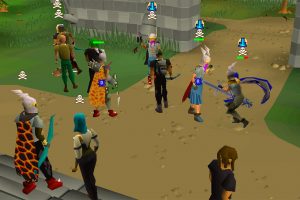Digital games (which includes video games, apps and arcade games) emerge quite naturally from digital technology, because computation (keeping score), interactivity (making play choices), narrative (story worlds), social interaction (fun with friends) and random effects (rolling dice) are all quite easy to simulate on a computer. Choose a favorite video game from your childhood and apply a brief game analysis as described in section 7.2 of the Digital Games chapter. What about the technology of the time made the game leave such an impression on you?
I picked up RuneScape (RS) around the age of 12 and never turned back. RS was a semi-pixelated, java scripted, 3-D fantasy MMORPG that took on a life of its own at the time. The game was originally released in 2001 and has since lived through several iterations to-date with a dedicated user base that keeps the RS economy and community thriving today. On its inception, the game was entirely browser based, making it extremely accessible for anyone with an internet connection – no discs, no external downloads, just a loading screen on internet explorer or your browser of choice. As soon as you entered the game you were prompted to create a name for your character, customize their look and then immediately thrown into tutorial island with dozens of other people learning the mechanics of the game just the same as you. The game runs you through a brief introduction of certain skill mechanics such as cooking, fishing, and combat and before you know it, you’re thrown off the deep end into the world where you’re free to interact with who ever you want, whenever you want and explore the RS world as you see fit. This idea of exploration was massive for me at the time, I had never experienced anything like it. It felt like I was making decent headway through tutorials of how to progress my character, only to have my training wheels ripped from me and thrown into an enchanting and equally dangerous world with nothing but a few fundamentals on how the game worked. I was both overwhelmed and completely hooked. There was no handholding, and at the time there was little to no archival data that I could investigate to help me progress through the game, there was only me, the game, and the community who was attempting to dissect and navigate through the exact same world. It was a huge leap from the “point A to point B”, scripted video games that I was so used to playing as a kid on PlayStation or an old Sega Genesis. This was revolutionary to me – I was free to choose whatever path I wanted, complete any quest in any order I chose, skip things I didn’t want to do and interact with a small world of people along the way.

The opportunities and amount of things to do in this game seemed endless. I would find myself playing Castle Wars for hours, which was a castle siege, capture-the-flag style mini game, where you and your team would fight against a team of enemy players on a map disconnected from the proper RS world. You would be rewarded with certain armors, weapons, and other cosmetic items and it was an overall environment where people could come and flex the gear they had acquired from playing and grinding out content out in the RS world. There were dozens of mini games that you could play alone, with friends, or even with small armies that were fun, and were sometimes equally rewarding. It was the epitome of a “choose your path” type of video game for me that stood the test of time, as it is still fully operational today.